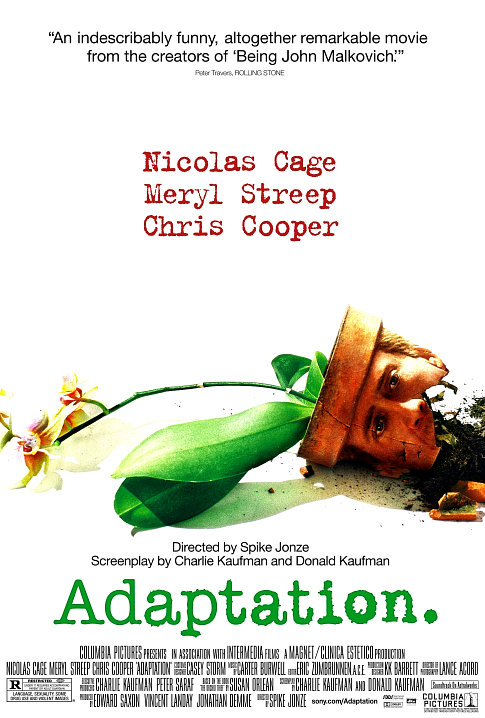Adaptation review by Jackass Tom
Kaufman is damn good
When I initially saw Being John Malkovich I wasn’t to impressed. I don’t know if it was the fact that someone screwed up one of the film reels, uncomfortable campus seating at McAlister Auditorium, or the fact that I expected something completely different. I did give it another chance and another and pretty soon, I wasn’t giving it another chance, I was just repeating the pleasurable event of consuming good cinema. The story was so unusual and so enthralling that I kept getting pulled in. The film is layered with meanings (obsession of being someone else, self obsession, theories of self, and transexuality) and the layer on top is a blanket of quirky, oddball characters who are somewhat familiar and quite sincere. John Cusak’s character, for example, can be found at any computer lab on any campus, coding at 11:30pm on a Friday night. After my many viewings of Being John Malkovich I made it a point to see their next collaboration: Adaptation.
So what would you as a follow-up from the man who created a portal to John Malkovich’s Id and Superego? Kaufman creates a story about himself, Charlie Kaufman (dopey Nic Cage) as he struggles through the process of adapting a book, Orchid Thief, into a motion picture. The book itself is about a true story (supposedly, but maybe so) about female reporter who follows the rough and rugged, yet passionate white trash rogue botanist through the swaps of Florida in search of rare orchids ripe enough for stealing. Scenes of Kaufman’s self-loathing frustration are intertwined with clips from the book itself, which are actually scenes from the movie that he has yet to develop.
Kaufman struggles with his own inspiration to live up to something bigger than a studio writer. He picked this book because of its purity and because of the passion behind it. There is no action, there is no sex, it is about one man’s non-stop drive for rare perfection. Kaufman sees the bigger picture in Hollywood. Like many critics of film, he is skeptical about repeating himself let alone the work of others. His twin brother Donald (also Nic Cage looking dopey, but a bit more chipper with a solid dose of comic relief), however, decides to immerse himself into Charlie’s profession one day and becomes what Charlie loathes the most: a writer who copies, regurgitates, and becomes successful.
The scenes between Charlie and Donald are close to priceless. Nic Cage is far from my favorite actor and closer to movie kryptonite. For the first 15-20 minutes, I saw his character as just more over-acting Cage. As soon as Donald was introduced, I became immersed. It was such a drastic change between characters that it actually pushed me into believing the original character. Donald is still the same loser that Charlie is, but garnished with optimism instead of Charlie’s overwhelming pessimism. “Ignorance is bliss,” is the best way to describe Donald through Charlie’s eyes. He is more successful in the film industry and more confident with the ladies despite being not as cultured (writes pop material; not deep) and not attractive (with the same face picks up women Charlie can’t even dream up). I must admit, for this outstanding contrast, Cage gained an ounce or two of respect from me at that point.
CAUTION: It has just come to my attention that there are things below that could be considered ... SPOILERS!
This movie can be dissected more ways than a kindergarten bullfrog. The film open’s with writing credits for both Charlie Kaufman and his fictious brother Donald. Charlie says at the beginning of the film, with much conviction, “I don't want to cram in sex or guns or car chases or characters learning profound life lessons or growing or coming to like each other or overcome obstacles to succeed in the end. The book isn't like that, and life isn't like that, it just isn't. ” He also makes a reference to not wanting the orchids to turn into “poppy seed farms,” and hence wants the film to be something DIFFERENT and not a generic crime, drama, good guys, bad guys, thriller. And the film isn’t like that for the first hour or so. Then he asks Donald to help him finish the story. Donald is fresh off of his success with his own thriller, and all of a sudden the world between Kaufman and Orlean becomes one, and with Donald’s help, they discover sex, violence, guns, drugs (extracted from the orchids like poppy), car chases, obstacles being overcome and life’s lessons being taught. Many would and have complained about the ending of the movie, but that is the genius of it! A film was being created in the film: at first through Charlie’s eyes, and then Donald’s, so there is an INSTANT and awkward transition.
Charlie’s attitude even changes which is something he fought against having in his film. He ‘lived’ life a little more towards the end. He kissed the girl that he loved. His claims that life don’t change like it does in the movies seem so true when you actually seeing his life change on screen. The character that you know he is, couldn’t possibly have changed but through the apparent force of Hollywood (ie Donald’s style of formulaic writing), he has changed and he became a better man.
This movie is on my Strongly Advised to see list for anyone that likes to take the cinematic road less traveled. It is funny, and deep, and intriguing and I guarantee that you will have to see it more than once in order to take in its totality. If it is no longer in theatres give it a rent when it comes out on DVD, which is hopefully not that far away.









9 out of 10 Jackasses blog comments powered by Disqus
